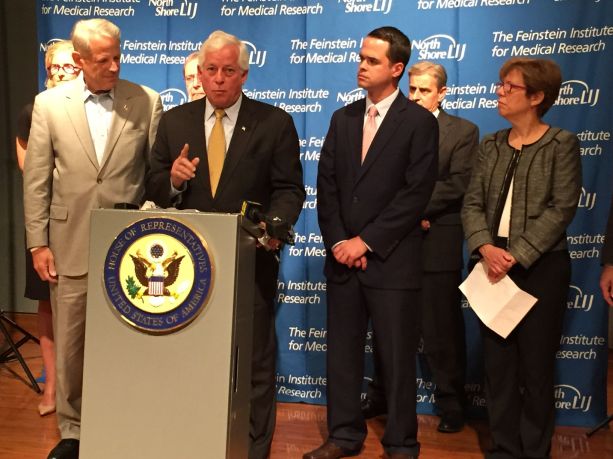State lawmakers said Tuesday they have the support in the Assembly and Senate to reintroduce legislation for a $1 billion referendum for neuroscience research that if passed would be placed on the 2016 election ballot.
During a news conference at the Feinstein Institute for Medical Research in Manhasset featuring the bill’s sponsors, state Assemblyman Charles Lavine (D-Glen Cove) and state Senator David Carlucci (D-Clarkstown), officials said the referendum would make New York a national leader toward the creation of a cure for Alzheimer’s disease.
“They call New York ‘the Empire State’ because we’re known for doing things that people said could never be done,” Carlucci said. “…If we can build the Erie Canal, we can find a cure for Alzheimer’s.”
Approximately 5.3 million Americans are living with Alzheimer’s disease, according to data from the Centers for Disease Control, a figure that is expected to spike to 16 million by 2050. It is the sixth leading cause of death in America.
Lavine, who first introduced the bill in 2014, said the referendum would present a “rare and unique opportunity for New York to take the lead on this issue.”
“Not only do we have millions of people suffering from this today in our nation, but we have so many millions more in families and caregivers making sure each day and each night that their loved ones are as comfortable as possible,” Lavine said. “Surely, we can do better.”
The legislation calls for $100 million to be utilized each year over a 10-year period toward Alzheimer’s research, at a $7 per year cost to taxpayers.
Though the federal government spends about $226 billion each year on the treatment of Alzheimer’s disease, annual costs are expected to reach $1.1 trillion by 2050.
About $600 million is allocated for Alzheimer’s research each year by the federal government.
“If California can be the stem cell research capital of America, and Texas can be the cancer research capital of America, and Kentucky can be the spinal cord research capital of America, then New York can be the neuroscience research capital of America,” said U.S. Rep. Steve Israel (D-Huntington), who issued his support for the referendum, citing other states who have set referendums or used a portion of funds incurred from traffic violations toward research.
Dr. Kevin J. Tracey, president of the Feinstein Institute, said the North Shore-LIJ Health System has approximately 800 researchers working in more than 50 labs toward medical advancements.
“When it’s done right, it benefits everybody and it changes the world,” he said.
Local caregiver organizations, including the Port Washington-based Long Island Alzheimer’s Foundation, also expressed support of the proposal Tuesday.
“We don’t want to just be there every step of the way,” said Tori Cohen, the foundation’s president. “We want to be at the finish line with you when you find a cure.”

